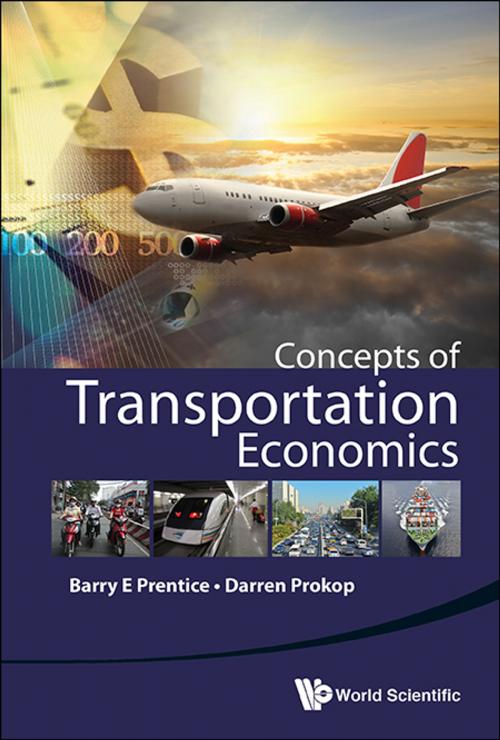Concepts of Transportation Economics
Business & Finance, Management & Leadership, Operations Research, Production & Operations Management| Author: | Barry E Prentice, Darren Prokop | ISBN: | 9789814656184 |
| Publisher: | World Scientific Publishing Company | Publication: | November 16, 2015 |
| Imprint: | WSPC | Language: | English |
| Author: | Barry E Prentice, Darren Prokop |
| ISBN: | 9789814656184 |
| Publisher: | World Scientific Publishing Company |
| Publication: | November 16, 2015 |
| Imprint: | WSPC |
| Language: | English |
Transportation is the world's largest invisible industry. Modern society is completely dependent on transportation to sustain its way of life, and it is all around us constantly. Yet the economics of transportation is a mystery to most people. Why do air fares rise and fall? Why do urban transit systems struggle to survive and require such large public subsidies? Why does freight transport cost more to move in one direction than an equal distance in another? Why is the government so heavily involved in transportation? Concepts of Transportation Economics provides explanations to these queries and many more, as well-renowned experts in the field, Barry E Prentice and Darren Prokop interpret the unique dynamics underlying transportation through the lens of applied economics, and demonstrate that the operations of transportation are completely logical and obvious once the concepts that underlie business decisions and consumer reactions are explained.
Contents:
- About the Authors
- Structure of the Text
- Transportation and Economic Theory
- Transportation, Logistics and Technology
- The Demand for Transportation
- Trade and Transportation Costs
- Laws of Variable Proportions and Scale
- Cost Economies and Traceability
- Modal Supply Characteristics
- Markets and Competition in Transportation
- Externalities, Public Supply and Marginal Cost Pricing
- Spatial and Temporal Pricing in Transportation
- Product Pricing in Transportation
- Transportation, Investment and Generalized Cost
- Location and Land Settlement
- Transportation and Government Policy
- Regulatory Enforcement and Compliance
Readership: Undergraduate students in transportation economics and business courses on logistics and supply chain management; MBA students; professionals in logistics and supply chain fields; government bureaucrats employed in departments of transportation; and transportation engineers.Key Features:
- The concepts are presented in a graphical form, making the book accessible to students with nothing more than an introductory knowledge of economics, not requiring readers to have any mathematical background
- The scope of the concepts explained is global and holistic. While some mode-specific treatment is necessary to explain differences in the reaction of different means of transport, the purpose is to introduce applications of modern economic theory in order to understand how the world works around us
- Succinct and concise writing, allowing the entire text to be covered in a single semester, with the added feature of exercises and examples at the end of every chapter
Transportation is the world's largest invisible industry. Modern society is completely dependent on transportation to sustain its way of life, and it is all around us constantly. Yet the economics of transportation is a mystery to most people. Why do air fares rise and fall? Why do urban transit systems struggle to survive and require such large public subsidies? Why does freight transport cost more to move in one direction than an equal distance in another? Why is the government so heavily involved in transportation? Concepts of Transportation Economics provides explanations to these queries and many more, as well-renowned experts in the field, Barry E Prentice and Darren Prokop interpret the unique dynamics underlying transportation through the lens of applied economics, and demonstrate that the operations of transportation are completely logical and obvious once the concepts that underlie business decisions and consumer reactions are explained.
Contents:
- About the Authors
- Structure of the Text
- Transportation and Economic Theory
- Transportation, Logistics and Technology
- The Demand for Transportation
- Trade and Transportation Costs
- Laws of Variable Proportions and Scale
- Cost Economies and Traceability
- Modal Supply Characteristics
- Markets and Competition in Transportation
- Externalities, Public Supply and Marginal Cost Pricing
- Spatial and Temporal Pricing in Transportation
- Product Pricing in Transportation
- Transportation, Investment and Generalized Cost
- Location and Land Settlement
- Transportation and Government Policy
- Regulatory Enforcement and Compliance
Readership: Undergraduate students in transportation economics and business courses on logistics and supply chain management; MBA students; professionals in logistics and supply chain fields; government bureaucrats employed in departments of transportation; and transportation engineers.Key Features:
- The concepts are presented in a graphical form, making the book accessible to students with nothing more than an introductory knowledge of economics, not requiring readers to have any mathematical background
- The scope of the concepts explained is global and holistic. While some mode-specific treatment is necessary to explain differences in the reaction of different means of transport, the purpose is to introduce applications of modern economic theory in order to understand how the world works around us
- Succinct and concise writing, allowing the entire text to be covered in a single semester, with the added feature of exercises and examples at the end of every chapter















